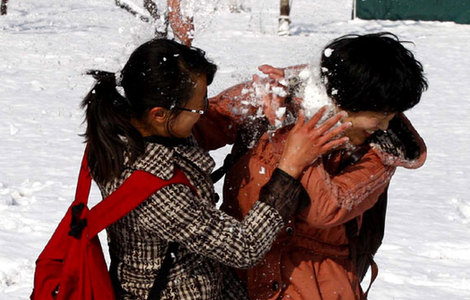 |
|
|
|
|||||||||||
Differences in quality
After graduating from the university in his native Guangdong province two years ago, Wang Jianhai was sent to Texas to get a master's degree, which his family believed would give him an edge in the job market.
His father worked at an electronics factory in Zhuhai and earned more than 10,000 yuan a month, so the adventure was not a great financial burden. However, after his return, 26-year-old Wang was no better prepared to find work.
Even his English skills had not improved, he said, as "we stayed with other Asians most of the time".
Eventually, his parents had to invest more money to help their only son eke out a meager living by running his own electronics store.
"He hasn't earned a penny back for us, even though we've taken care of him for 26 years, while other people his age might have earned more than 200,000 yuan by now," said his 66-year-old father, who did not want to be identified.
"We could have had a decent life after retirement with our savings, but now we've painted ourselves into a tight corner," he added bitterly.
Wang said his father has had to quit his favorite hobbies swimming and rock climbing to save money. He added: "It's not just the lack of money, the feeling we're now poor makes me really ashamed when I'm with friends."
Although parents see an overseas education as a shortcut to success, experts argue that very few truly understand the vast differences in quality that exist among colleges in developed nations.
"The quality of the schools is varied, from heaven to earth," said Lao at Capital Normal University.
In the United States, for example, one of the most popular destinations for Chinese students, options stretch from world-renowned Ivy League universities, such as Harvard or Yale, to about 3,000 community colleges. There are also many diploma mills, which require very little or even no academic study.
Zhou Rong, a senior advisor at New Oriental Vision Overseas Consulting, said that although every student dreams of going to a prestigious college in the US, many fall victim to diploma mills.
She provides guidance to at least 300 students every year and said only one or two academic stars will make it into an Ivy League college, with rest enrolled in common or even "nameless institutes".
"Regardless of where they end up, ultimately the value of a diploma (in this country) has been undermined due to the sheer amount of people who pursue one," Zhang in Yunnan added. "It's extremely silly for someone to pay such a high price for a diploma."
Looking abroad
Despite the struggles being experienced by families and returned students nationwide, the demand for places at overseas colleges does not show any sign of abating.
All 35 final-year students in a class at No 1 Middle School affiliated to Central China Normal University in Wuhan, Hubei province, have decided not to take the national college entrance exam in June; each has instead been admitted to a higher education institute in the US.
Wu Ying, iPad, Jeremy Lin, Valentine's Day, Real Name, Whitney Houston, Syria,Iranian issue, Sanyan tourism, Giving birth in Hong Kong, Cadmium spill, housing policy

|

|

|

|

|

|